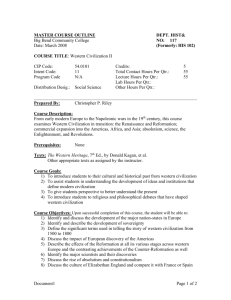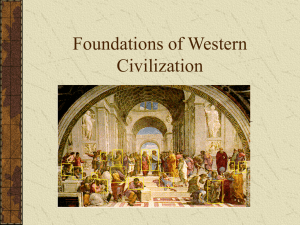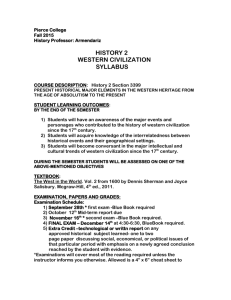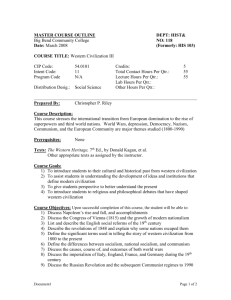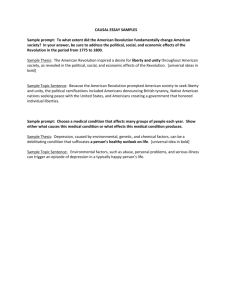The American Revolution as a Reflection of the Foundations of
advertisement
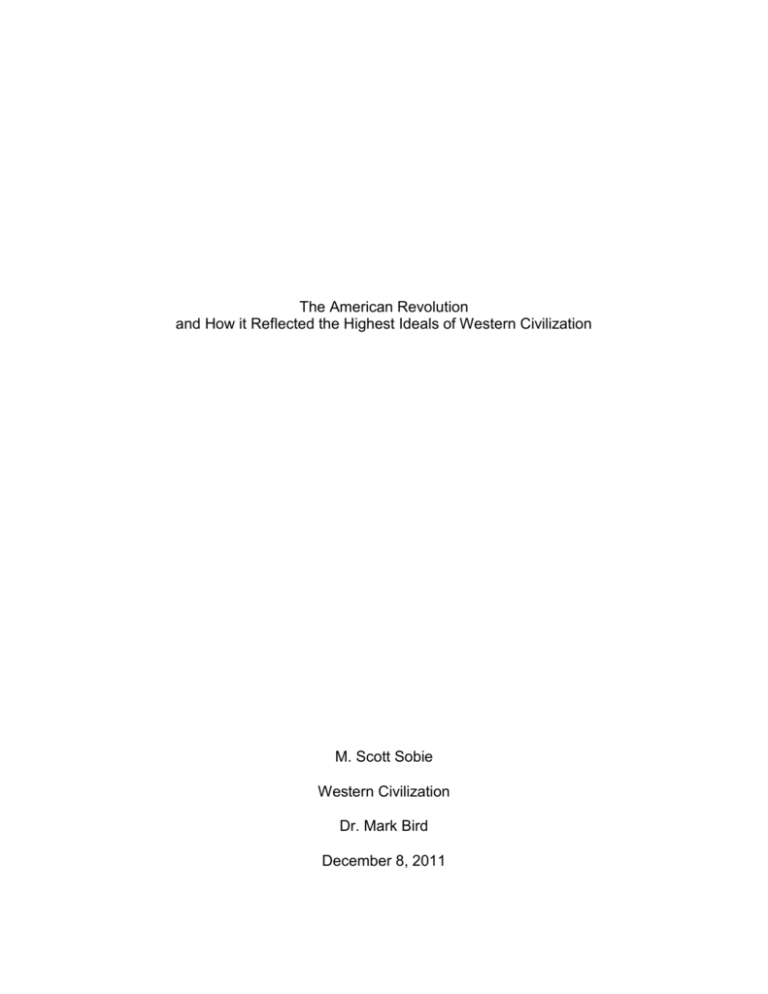
The American Revolution and How it Reflected the Highest Ideals of Western Civilization M. Scott Sobie Western Civilization Dr. Mark Bird December 8, 2011 On a summer day in July, 1776, a gathering of about fifty colonial British citizens signed their names to a document that would mark an epic moment in the history of western civilization. These men were delegates to the American continental congress of the thirteen colonies and they were declaring their independence from Britain. The Declaration of Independence that lay on the table of the meeting hall in the Philadelphia statehouse that day contained the principles and ideals behind the American Revolution. Among the famous sentiments etched into that venerable document were the words, “We hold these truths to be self-evident, that all men are created equal, that they are endowed by their Creator with certain unalienable Rights, that among these are Life, Liberty and the pursuit of Happiness.” Within these bold words can be observed some of the fundamental ideas that had shaped western civilization for centuries: the intrinsic equality of mankind, faith in God, universal human rights and liberty. This paper will endeavor to show that the American Revolution was a powerful culmination of the foremost influences which had shaped western culture. Three Primary Contributing Traditions Behind Western Civilization Before it can be possible to examine the founding of America in light of the highest ideals of western civilization, it must first be determined what are those characteristics. In his article, “Western Civilization, Our Tradition,” Professor of Political Science James Kurth writes, “Among scholarly interpreters of the West, it has been widely understood that Western civilization was formed from three distinct traditions: (1) the classical culture of Greece and Rome; (2) the Christian religion, particularly Western Christianity; and (3) the Enlightenment of the modern era.”i Although there are certainly many factors that have shaped the western world, these three traditions have been among the strongest forces to determine the distinctive attributes of western civilization. The motivating influence of these three traditions can be clearly seen in the people, philosophy and political ideas involved in the formation of America. The Influence of the Christian Faith upon the People of the Revolution There was no doubt in the mind of the French historian Alexis de Tocqueville that religious faith was a strong factor in the early Americans’ push for freedom and independence. As he analyzed the new nation of America just half a century after the revolution, he wrote of the “spirit of Religion” combined with the “free spirit of Liberty” which “in other places have been in frequent hostility, but which in America have been admirably incorporated and combined with one another.”ii He then declared that religion was actually “the cradle” of liberty in America.iii Far from the complete rejection of religious faith that so characterized the French Revolution, the American Revolution was actually motivated, in part, by the deep faith of the founding fathers and colonial Americans and their belief in man’s God-given rights of freedom. This can be seen in the fact that clergymen were a major part of the formation of American. Gordon S. Wood, in his book “The American Revolution: A History,” writes, “Protestant ministers were in the forefront of the Revolutionary movement. In fact, it was the clergy who made the Revolution meaningful for most common people.”iv There is no question that not all of the founding fathers of America were theologically orthodox Christians. Yet, even the most skeptical and deistic among the founders were deeply influenced and motivated by religious faith that had come to them through the influence of Christianity. Even Thomas Paine, probably the strongest skeptic of religion among the founders, devoted a large part of his revolutionary pamphlet, “Common Sense,” to a Biblical rationale for American independence! It is true that, as the 1797 Treaty of Tripoli states, “the Government of the United States is not, in any sense, founded on the Christian religion”v in the sense that it is a theocracy or that Christianity is the mandated state religion. However, it is just as true and certain that the deep religious faith of the founding fathers of America was a strong motivating force in their movement for independence. George Washington went so far as to say, “Reason and experience both forbid us to expect that national morality can prevail in exclusion of religious principle...Who that is a sincere friend to [free government] can look with indifference upon attempts to shake the foundation of the fabric?”vi In William Jackman’s “History of the American Nation,” he describes one of the leading American founders in this way: “None had greater influence than Samuel Adams—in his private life, the devout Christian; in his public life, the incorruptible patriot.” vii The other founding fathers expressed their personal faith in their speeches and writings. James Madison called Christianity “the best and purest religion.”viii Thomas Jefferson declared, ““To the corruptions of Christianity I am, indeed opposed; but not to the genuine precepts of Jesus himself. I am a Christian, in the only sense in which he wished any one to be.”ix John Adams, after recognizing what he believed were corruptions in the Christian church stated, “Conclude not from all this that I have renounced the Christian religion. Far from it...The ten commandments and the sermon on the mount contain my religion.”x Benjamin Franklin cautioned his fellow Americans, “We have been assured...in the Sacred Writings that except the Lord build the house, they labor in vain that build it. I firmly believe this; and I also believe that without His concurring aid, we shall succeed in this political building no better that the builders of Babel.”xi Clearly, religious faith and Christianity, in particular, had a deep influence in the thinking and motivation of America’s founders who believed that it was God the Creator who had endowed them “with certain unalienable rights.” This pillar of western civilization became a pillar of the new American nation as well. The Influence of the Age of Enlightenment upon the Philosophy of the Revolution The Age of Enlightenment, which began in the middle of the seventeenth century, also had an enormous influence upon western civilization. Although there were elements of the Enlightenment that were antithetical to Christianity, the basic departure from superstition to reason and from tyrannical oppression to egalitarianism were very much in harmony with Biblical principles. According Kurth, the Enlightenment “provided the ideas of liberal democracy, the free market, and the belief in reason and science as the privileged means for making sense of the world.”xii These ideas, which became hallmarks of western civilization, had profound influence upon the American colonists and the philosophy of democracy, equality and liberty that was a driving force behind the American Revolution. Alexis de Tocqueville observed that these concepts which were made so popular by the Age of Reason had actually come to American with the Puritans, who had arrived in America seeking religious liberty. He writes, “Puritanism was not merely a religious doctrine, but it corresponded in many points with the most absolute democratic and republican theories...The boldest theories of the human reason were put into practice by a community so humble that not a statesman condescended to attend to it!” xiii This pursuit of the Enlightenment ideal of liberty continued to burn in the hearts of the future generations of American colonists until it was embodied in the words of the Declaration of Independence. Gordon S. Wood declares that the Declaration was “a brilliant expression of Enlightenment ideals—ideals that still reverberate powerfully in the lives of Americans and other peoples today.”xiv The Influence of Greek and Roman Thought upon the Politics of the Revolution The classical culture of democratic Greece and republican Rome provided the underlying democratic political philosophies that would inspire western man in the following centuries. The European civilization from which the American colonists had come was a successor to the Roman Empire which had, in turn, sprung from the golden age of the Roman Republic. Rome had been significantly influenced by Greek culture and thought. James Kurth described the significance of this influence when he wrote, “Greece contributed the idea of a republic, while Rome contributed that of an empire. Similarly, Greece contributed the idea of liberty, and Rome, that of law. When combined, these ideas gave rise to the important Western concept of liberty under law.”xv Regarding the American Revolution, as John Adams himself referred to what he called “revolution principles,” he made the argument that these principles were “the principles of Aristotle and Plato, of Livy and Cicero...”xvi Historian George Bancroft explained that the founding fathers of America “were aided in their deliberations by the teachings of the law-givers of Greece; by the line of magistrates who had framed the Roman code; by those who had written best in English on government and public freedom.”xvii In fact, so deeply was the imagery of the ancient classical cultures ingrained in the consciousness of the American founders that the fiery revolutionary, Samuel Adams, would actually say that he dreamed of his town, Boston, becoming “a Christian Sparta!”xviii Truly, political ideas of ancient Greece and Rome were a strong influence in the founding of America. The highest values and ideals of Western civilization were at work in the formation of the United States of America. The Revolution marked a culmination of those positive influences and a blending of them into one nation that would effectively carry the torch of all that was good about western civilization into the future. Bibliography 1. Western Civilization, Our Tradition by James Kurth—Fall 2003/Spring 2004, Intercollegiate Review 2. The American Revolution by Gordon S. Wood 3. Democracy in America by Alexis de Tocqueville 4. History of the American Nation (Volume 2) by William J. Jackman 5. History of the United States (Volumes 1 and 2) by George Bancroft 6. WallBuilders.com - Historical Writings (http://www.wallbuilders.com/LIBHistoricalWritings.asp) Endnotes: James Kurth, Western Civilization, Our Tradition—Fall 2003/Spring 2004 Intercollegiate Review, pg. 5 ii Alexis de Tocqueville, Democracy in America, vol.1, p. 42 iii Alexis de Tocqueville, Democracy in America , vol.1, p. 43 iv Wood, Gordon S. (2002). The American Revolution: A History (Modern Library Chronicles) (p. 129). v Treaty of Peace and Friendship, Signed at Tripoli November 4, 1796, Article 11 vi James D. Richardson, A Compilation of the Messages and Papers of the Presidents, George Washington, vol. 1, p.212 vii William J. Jackman, History of the American Nation, vol.2, p.401 viii Daniel L. Dreisbach, ed., Religion and Politics in the Early Republic: Jasper Adams and the Church-State Debate, p. 117 ix Albert Bergh, Writings of Jefferson, Vol. X, p.380 x Charles Francis Adams, The Works of John Adams, Second President of the United States: With A Life of the Author, Volume IX xi Henry D. Gilpin, ed., James Madison, The Papers of James Madison, Vol. II, p. 985. xii James Kurth, Western Civilization, Our Tradition—Fall 2003/Spring 2004 Intercollegiate Review, pg. 6 xiii Alexis de Tocqueville, Democracy in America, vol.1, pgs. 31 and 41 xiv Wood, Gordon S. (2002). The American Revolution: A History (Modern Library Chronicles) (p. 57) xv James Kurth, Western Civilization, Our Tradition—Fall 2003/Spring 2004 Intercollegiate Review, pg. 6 xvi Merrill Jensen, Tracts of the American Revolution 1763-1776, pg. 301 xvii George Bancroft, History of the United States, vol.4, p.426 xviii Wood, Gordon S. (2002). The American Revolution: A History (Modern Library Chronicles) (p. 129) i


